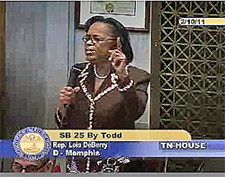After two hours of debate and a lopsided two-to-one party-line rejection of various amendments, the state House of Representatives on Thursday followed earlier action by the state Senate on Monday night and voted 64-31 to pass SB25, a bill sponsored by state Senator Mark Norris of Collierville in the Senate and, as HB51, by Rep. Curry Todd of Collierville in the House.
The bill would delay school consolidation in Shelby County, create a “planning commission” for consolidation, and permit the ultimate creation of special school districts in the county suburbs.
Included in the rejected amendments by Rep. Craig Fitzhugh of Ripley, the House Democratic leader; by Rep. Harry Tindle of Knoxville, and by Memphis representatives Lois DeBerry, Jeannie Richardson; Joe Towns, G.A. Hardaway, and Johnnie Turner were several that would:
-Give Mayor A C Wharton membership and appointive rights on the planning commission provided by the bill, which the protesting Memphians regard as slanted toward outer-county interests-;
-Provide for racial diversity in the membership of the commission;
-Eliminate the bill’s provision that would enable creation of special school districts;
-Define “competent” in relation to the bill’s stated qualification for commission members;
-Require a comprehensive plan from any prospective new special school district.
Over and over, the Memphians and other Democrats — like Fitzhugh, Tindle Sherry Jones and Mike Stewart of Nashville and former Speaker Jimmy Naifeh of Covington — protested that, by passing SB25, the state would be acting in defiance of local Shelby County authorities — specifically the Shelby County Commission and the Memphis City Council, both of which have formally opposed the bill — and would be acting in the same overbearing manner that Republicans members have depicted “Washington” as doing in imposing its will on state governments.
Over and over, the bill’s opponents quoted Governor Bill Haslam and House Speaker Beth Harwell of Nashville herself as having proclaimed sentiments to the effect that the best government is local government — in Harwell’s words, “government that is closest to the people.”
All to no avail. State Rep. Curry Todd of Collierville heard out each complaint and each amendment, from time to time commenting, more or less in the same general terms with which he had presented the bill, from time to time declining to comment, and in each case moving successfully that the amendments be tabled.
As Todd had asserted in his overview, the essential premise of SB25 was that 49-2-5021 the code section of state law under which the Memphis City Schools board had acted in voting on December 20 to transfer its charter to Shelby county Schools, had never before been used, was “vague,” and had omitted to provide for an orderly transition plan.
“Major chaos” in Shelby County would be the result, Todd said. As for state involvement, Todd, citing the “case law” of Small Schools vs. McWherter, said the state’s sizeable financial commitment made it something other than a local matter.
In a press conference after the House session, members of the Democratic caucus met to express disappointment in the outcome.
Praising the amendments which had been presented, Democratic majority leader Craig Fitzhugh of Ripley, said that most House members had been given very little information about the bill before Thursday’s session. He expressed the hope that the Assembly would not “continue to intervene on local issues” by fast-tracking such bills.
Both former Speaker Naifeh and current Democratic caucus chairman Mike Turner of Nashville commented on what they saw as an “unprecedented” involvement of the state in a local matter. “It hurts me to my core,” Turner said.
Rep. Miller pointed out that the House vote had occurred “strictly along party lines” and expressed the hope that the Memphis City Council would vote at its scheduled Thursday afternoon meeting to formally accept the surrender of the MCS charter in advance of the scheduled automatic acceptance which, according to a prior Council vote, would become automatic next month. The issue had turned into one, not of education, but of “money and power and control,” Miller said.
“I don’t know motives or intention, but it’s obvious to see the effects,” Richardson said. “The way the commission is set up, such a high proportion of power goes to the county, which is primarily white.”
It was a matter of “playing by the rules or running roughshod,” said Rep. Towns, adding, “What’s good for the goose is good for the gander.”
Several members of the Democratic caucus commented on the likelihood that the issues of the bill — and of school consolidation generally — would be settled in the courts.
This seemed a given, considering not only the consequences of what the Council might do Thursday but what the Shelby County Commission, which has prepared its own transition plan, had done on Wednesday, formally voting to oppose SB25 and to appoint a lawyer to represent its interests in litigation.
Meanwhile, the Norris-Todd bill will go to Governor Haslam for action. He may sign it into law; let it pass without his signature (which would happen automatically after 10 days); or veto it, in which case a simple majority vote in both House and Senate would be enough to override.
